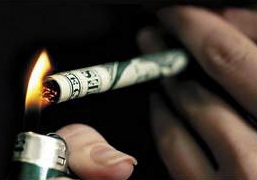Stogie Commentary: The Cost of ‘Smoke Free’ Air
27 Mar 2007
We try not to wax too political (or economical) here – after all, we prefer cigars to politics – but every once in awhile a political pundit just gets the whole smoking ban issue perfectly right. In this case, it’s famed George Mason University economist Walter E. Williams.
 In a recent column, Dr. Williams explained that when anti-smokers use the government to ban smoking, they ignore economics and common sense:
In a recent column, Dr. Williams explained that when anti-smokers use the government to ban smoking, they ignore economics and common sense:
The cost to nonsmokers to impose their will on smokers, say, in a restaurant, bar or airplane, is zero, or close to it. They just have to get the legislature to do their bidding. When the cost of something is zero, there’s a tendency for people to take too much of it. You say, “Williams, in my book, there can never be too much smoke-free air!” Here’s a little test. Say your car’s out of gas and stuck in a blizzard. You wave me down for assistance. I say, “I’ll be glad to give you a lift to safety, but I’m smoking in my car.” How likely is it that you’ll turn down my assistance in an effort to avoid tobacco smoke? You might be tempted to argue, “That’s different.” It’s not different at all. The cost of a smoke-free environment is not what you’re willing to pay.
Say you don’t permit smoking in your house. When I visit, I offer to pay you $100 for each cigarette you permit me to smoke. Instantaneously, I’ve raised the cost of your maintaining a smoke-free environment. Retaining smoke-free air in your home costs the sacrifice of $100. Of course, I could offer you higher amounts, and economic theory predicts that at some price, you’ll conclude your 100 percent smoke-free air isn’t worth it.
Air that’s either 100 percent smoke-filled or 100 percent smoke-free is probably sub-optimal. At zero prices there will either be too much smoking or too little smoking. The problem in our society is that laws have created too much smoke-free air. To a large degree, it’s the fault of smokers, who haven’t created a cost to smoke-free air.
My rule is by no means absolute. There are instances where I put up with zero-priced smoke-free air, and there are other instances where I don’t. It all depends on the cost to me. I think other smokers ought to adopt the same agenda. Say you’re asked to do some volunteer work. You might answer, “Yes, if I’m allowed to smoke.” This strategy might also be a nice way to get out of doing something without saying no. Just ask whether smoking is permitted.
The economic lesson to extract from all of this is that zero prices lead to sub-optimal outcomes, and it doesn’t just apply to the smoking issue. How would you like zero prices at the supermarket or clothing store? If there were, what do you think you’d see on the shelves when you arrived? If you said, “Nothing, because people would take too much,” go to the head of the class.
All too often, anti-smoking zealots overlook the adverse consequences smoking bans impose on individual freedom and – like in this case – sub-optimal economic outcomes. They can’t be bothered with these realities in their furor.
Many thanks to Dr. Williams for this important, straightforward column.

 Patrick Ashby
Co-Founder & Editor in Chief
Patrick Ashby
Co-Founder & Editor in Chief Patrick Semmens
Co-Founder & Publisher
Patrick Semmens
Co-Founder & Publisher George Edmonson
Tampa Bureau Chief
George Edmonson
Tampa Bureau Chief
Thanks for bringing this column to my attention. As a cigar smoker who's really not that into politics and/or economics, even I found Dr. Williams' points easy to follow and logical. It's always good to have examples in your arsenal to debate "anti-smoking zealots."
Not to be contrarian (because I generally like Williams and acknowledge that he makes some good points here), but…
I guess I'd rather distinguish between "cost" and "money not received." Again, I'm no economist (nor do I play one on TV), but turning down an offer of $100 for someone who wants to smoke in my living room doesn't seem like an actual out-of-pocket cost.
If it is, then I guess it's "costing" my beautiful neighbor a lot of money not to be a prostitute. Many thousands of dollars per week, most likely.
Just my two cents (no pun intended).
But why should non-smokers have to pay for 'smoke free' air?
If flatulance were a hobby, would we complain about the demands of the bullying non-gaseous for "fart free air"?
These are all good comments, and I'm glad this post generated some useful discussion.
Scott, I understand where you're coming from here, but I think you may be confusing "cost" and "opportunity cost" (which is the most valuable forgone alternative). An economist would agree that it is costing your neighbor money not prostituting herself, but that cost is offest by what she earns otherwise with her time.
Jose, you bring up an interesting point, but let's not forget that the businesses that are forced to go smoke-free by government-imposed bans are private. Business owners have the right to choose which amenities to allow, and which to prohibit. When they have the freedom to do so, the market automatically adjusts for customers who prefer nonsmoking facilities. That is, after all, why so many businesses were smoke-free before any bans were in place. They do what will produce the most profit. Smoking bans bypass this because the government bans remove the cost factor.
I hope this long-winded comment clears some issues up.